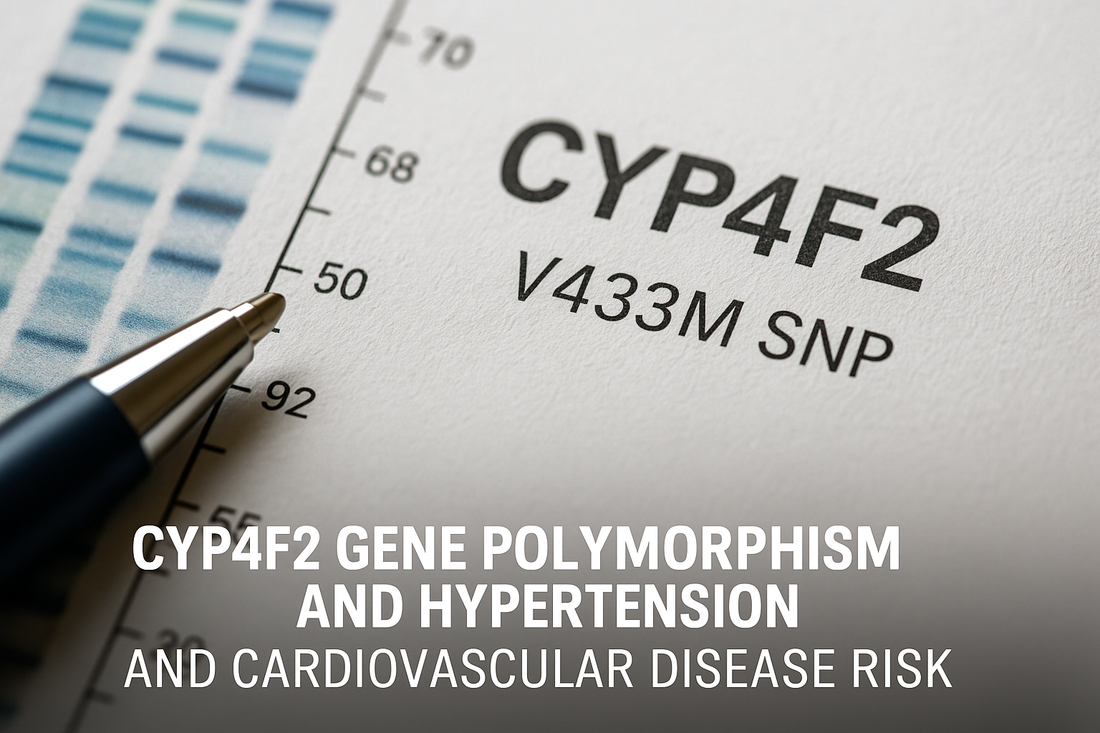CYP4F2: The Vitamin K Oxidase Variant and Its Link to Cardiovascular Health
Introduction
The CYP4F2 gene, located on chromosome 19p13, encodes a cytochrome P450 enzyme that participates in fatty acid metabolism and vitamin K oxidation. Its best-characterized variant is V433M (rs2108622), which results in a valine-to-methionine substitution.
This polymorphism plays dual roles in cardiovascular health:
-
Vitamin K metabolism – altering warfarin dose requirements and vascular calcification risk.
-
Blood pressure regulation – through effects on 20-hydroxyeicosatetraenoic acid (20-HETE), a metabolite that regulates vascular tone and renal sodium handling.
Your CardiaX test includes CYP4F2 because its polymorphisms can increase risk for hypertension, arterial stiffness, and cardiovascular disease, but also provide clear therapeutic opportunities.
The Biology of CYP4F2
-
Normal function: CYP4F2 metabolizes long-chain fatty acids and vitamin K.
-
Vitamin K role: By oxidizing vitamin K, CYP4F2 affects the carboxylation of clotting factors and matrix Gla protein (MGP), a key inhibitor of vascular calcification.
-
20-HETE role: CYP4F2 contributes to the production of 20-HETE, a lipid mediator that regulates renal sodium excretion, vascular tone, and BP.
The V433M Variant (rs2108622)
-
Effect on vitamin K: The 433M allele reduces enzymatic activity, leading to higher circulating vitamin K.
-
Warfarin interaction: Carriers typically require higher warfarin doses due to reduced metabolism of vitamin K.
-
Impact on cardiovascular risk:
-
Reduced activity may help maintain vitamin K levels, which is protective against vascular calcification.
-
But altered 20-HETE balance can predispose to hypertension and endothelial dysfunction.
-
Cardiovascular Risks Associated with CYP4F2 Variants
-
Hypertension
-
20-HETE regulates renal sodium handling and vascular tone. Dysregulation contributes to salt-sensitive hypertension.
-
-
Arterial Stiffness and Calcification
-
Imbalance in vitamin K metabolism can lead to under-carboxylated MGP, impairing vascular protection.
-
-
Ischemic Stroke
-
Studies link the variant to altered stroke risk, particularly in those with high blood pressure.
-
-
Drug-Gene Interactions
-
Warfarin sensitivity and BP medication responses may be altered by this SNP.
-
What Increases CYP4F2-Related Risk?
-
High-salt diets: Exacerbate 20-HETE-mediated hypertension.
-
Low dietary vitamin K: Magnifies vascular calcification risk.
-
Obesity and insulin resistance: Worsen endothelial dysfunction.
-
Chronic inflammation: Interacts with oxidative stress pathways.
-
Warfarin therapy: Increases complexity of management in carriers.
How to Mitigate Risk
1. Lifestyle Strategies
-
Balanced sodium intake: Aim for <2,000 mg/day, especially if salt-sensitive.
-
Vitamin K-rich diet: Leafy greens (kale, spinach, collards), broccoli, Brussels sprouts.
-
Mediterranean diet: Anti-inflammatory and cardioprotective.
-
Exercise: Improves endothelial function and BP control.
-
Weight optimization: Improves insulin sensitivity and vascular health.
2. Nutraceuticals
-
Vitamin K2 (MK-7): Supports vascular calcification prevention by activating MGP.
-
Omega-3 fatty acids — Omega 1300: Modulate vascular tone and reduce inflammation.
-
CoQ10 Omega — CoQ10 Omega: Improves mitochondrial efficiency and endothelial function.
-
Curcumin Complex — Curcumin Complex: Reduces oxidative stress.
-
Magnesium glycinate: Improves vascular tone and helps counteract high-salt effects.
3. Peptide Therapies (Supervised Use)
-
BPC-157: Supports vascular healing and microcirculation.
-
KPV: Anti-inflammatory effects, useful for vascular protection.
-
MOTS-c: Improves insulin sensitivity and mitochondrial function.
4. Medications
-
Mineralocorticoid receptor antagonists (MRAs): Can help in resistant hypertension cases.
-
ACE inhibitors/ARBs: Lower BP and protect the endothelium.
-
Warfarin users: Genotype-guided dosing (higher dose requirements in carriers).
Case Example
A 65-year-old woman with hypertension and atrial fibrillation is on warfarin. Her CardiaX test shows a CYP4F2 433M allele.
Plan:
-
Nutrition: Increased intake of vitamin K2-rich foods (while maintaining consistent levels for warfarin dosing).
-
Supplements: Omega 1300, CoQ10 Omega, Curcumin Complex.
-
Medications: Warfarin dose adjusted upward; ARB added for BP control.
-
Peptides: MOTS-c considered for metabolic support.
Result: Improved BP control, stabilized INR with adjusted warfarin dosing, reduced markers of vascular inflammation.
The Bottom Line
The CYP4F2 V433M variant highlights the connection between vitamin K metabolism, vascular calcification, and blood pressure regulation. With insights from CardiaX, you can personalize your prevention plan through nutrition, supplements, peptides, and medications.
For patients on warfarin, CYP4F2 testing is especially useful to guide dose and prevent clotting or bleeding complications.
References
-
Caldwell MD, et al. CYP4F2 genetic variant alters vitamin K oxidation and influences warfarin dose. Blood. 2008.
-
Ward NC, et al. CYP4F2 gene polymorphism, hypertension, and cardiovascular disease. Hypertension. 2010.
-
McDonald MG, et al. CYP4F2 is a vitamin K1 oxidase. Mol Pharmacol. 2009.
-
Fava C, Montagnana M. A variant of the CYP4F2 gene and cardiovascular risk. J Hypertens. 2011.


